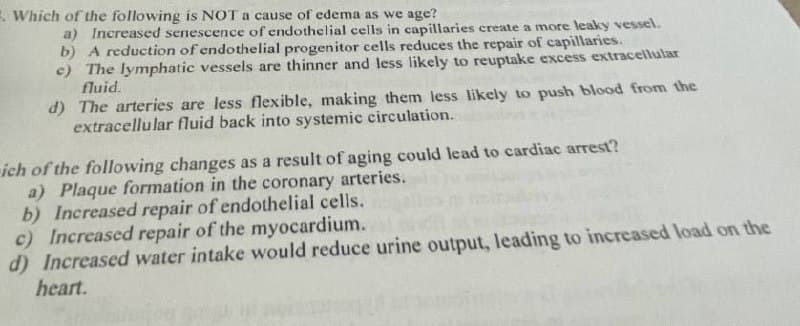E. Which of the following is NOT a cause of edema as we age? a) Increased senescence of endothelial cells in capillaries create a more leaky vessel. b) A reduction of endothelial progenitor cells reduces the repair of capillaries. c) The lymphatic vessels are thinner and less likely to reuptake excess extracellular fluid. d) The arteries are less flexible, making them less likely to push blood from the extracellular fluid back into systemic circulation. ich of the following changes as a result of aging could lead to cardiac arrest? a) Plaque formation in the coronary arteries. b) Increased repair of endothelial cells. c) Increased repair of the myocardium. d) Increased water intake would reduce urine output, leading to increased load on the heart.
E. Which of the following is NOT a cause of edema as we age? a) Increased senescence of endothelial cells in capillaries create a more leaky vessel. b) A reduction of endothelial progenitor cells reduces the repair of capillaries. c) The lymphatic vessels are thinner and less likely to reuptake excess extracellular fluid. d) The arteries are less flexible, making them less likely to push blood from the extracellular fluid back into systemic circulation. ich of the following changes as a result of aging could lead to cardiac arrest? a) Plaque formation in the coronary arteries. b) Increased repair of endothelial cells. c) Increased repair of the myocardium. d) Increased water intake would reduce urine output, leading to increased load on the heart.
Chapter9: Parenteral Medication Labels And Dosage Calculation
Section: Chapter Questions
Problem 7.2P
Related questions
Question

Transcribed Image Text:E Which of the following is NOT a cause of edema as we age?
a) Increased senescence of endothelial cells in capillaries create a more leaky vessel.
b) A reduction of endothelial progenitor cells reduces the repair of capillaries.
c) The lymphatic vessels are thinner and less likely to reuptake excess extracellular
fluid.
d) The arteries are less flexible, making them less likely to push blood from the
extracellular fluid back into systemic circulation.
ich of the following changes as a result of aging could lead to cardiac arrest?
a) Plaque formation in the coronary arteries.
b) Increased repair of endothelial cells.
c) Increased repair of the myocardium.
d) Increased water intake would reduce urine output, leading to increased load on the
heart.
Expert Solution
This question has been solved!
Explore an expertly crafted, step-by-step solution for a thorough understanding of key concepts.
Step by step
Solved in 3 steps

Knowledge Booster
Learn more about
Need a deep-dive on the concept behind this application? Look no further. Learn more about this topic, biology and related others by exploring similar questions and additional content below.Recommended textbooks for you


Surgical Tech For Surgical Tech Pos Care
Health & Nutrition
ISBN:
9781337648868
Author:
Association
Publisher:
Cengage

Anatomy & Physiology
Biology
ISBN:
9781938168130
Author:
Kelly A. Young, James A. Wise, Peter DeSaix, Dean H. Kruse, Brandon Poe, Eddie Johnson, Jody E. Johnson, Oksana Korol, J. Gordon Betts, Mark Womble
Publisher:
OpenStax College


Surgical Tech For Surgical Tech Pos Care
Health & Nutrition
ISBN:
9781337648868
Author:
Association
Publisher:
Cengage

Anatomy & Physiology
Biology
ISBN:
9781938168130
Author:
Kelly A. Young, James A. Wise, Peter DeSaix, Dean H. Kruse, Brandon Poe, Eddie Johnson, Jody E. Johnson, Oksana Korol, J. Gordon Betts, Mark Womble
Publisher:
OpenStax College